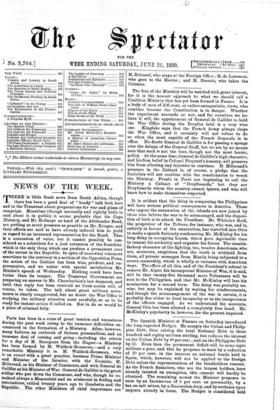The fate of the Ministry will be watched with great
interest, for it is the nearest approach to what we should call a Coalition Ministry that has yet been formed in France. It is a body of men of different, or rather antagonistic, views, who combine because the Constitution is in danger. Whether the experiment succeeds or not, and for ourselves we be- lieve it will, the appointment of General de Gallifet to hold the War Office during the Dreyfus trial is a very wise one. Kinglake says that the French Army always obeys the War Office, and it certainly will not refuse to do so when the most capable of the French Generals is in office. No doubt General de Gallifet is for passing a sponge over the doings of the General Staff, but we are by no means sure that such is not the best, though not the most heroic, policy. At the same time, General de Gallifet's high character, and his firm belief in Colonel Picquart's honesty, will preserve him from allowing any injustice to continue. M. Millerand's presence in the Cabinet is, of course, a pledge that the Socialists will not combine with the reactionaries to wreck the Ministry. People in Paris are beginning to call the Ministry a Cabinet of " Dreyfusards," but they are Dreyfusards whom the country cannot ignore, and who will know how to make themselves respected.


















































 Previous page
Previous page